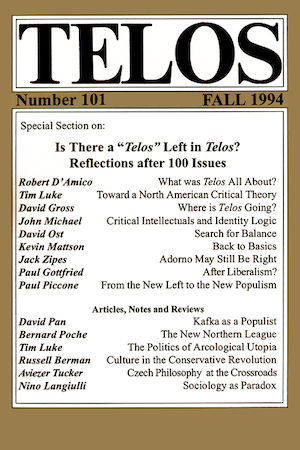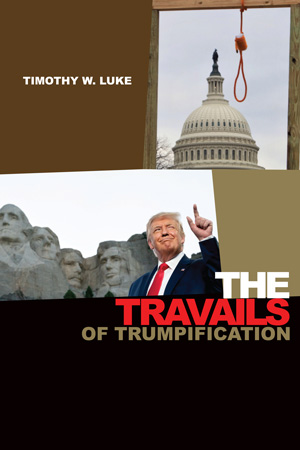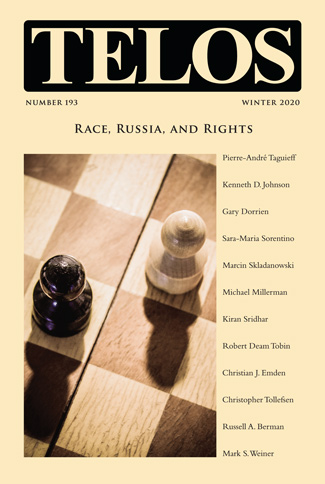By Florindo Volpacchio · Wednesday, December 28, 2022 If a journal manages to survive for 100 issues, it is reasonable to assume that the editorial board has managed to reach some sort of internal consensus and can finally rest on its laurels. Such is not the case with Telos. . . . After all these years, nothing seems to be settled and [Telos] remains a hopelessly heterogeneous group still trying to come to some agreement concerning many crucial and not-so-crucial issues. . . . This is why this theoretical bellum omnium contra omnes may be interpreted as evidence of lingering internal vitality, an unwillingness to take anything for granted, and a suspicion of all positions even faintly resembling conformism and passivity.
 With those words from Telos 101 (Fall 1994), Paul Piccone launched his critique of those who felt Telos had lost its direction and had settled into the role of the cranky old uncle of intellectual journals. Having just celebrated its 200th issue in its 54th year, those words still speak to the current state of the intellectual project he launched back in 1968. With those words from Telos 101 (Fall 1994), Paul Piccone launched his critique of those who felt Telos had lost its direction and had settled into the role of the cranky old uncle of intellectual journals. Having just celebrated its 200th issue in its 54th year, those words still speak to the current state of the intellectual project he launched back in 1968.
Piccone’s critique of his critics, “From the New Left to the New Populism,” was intended not to lay claim to any settled doctrine for Telos but to demonstrate the journal’s ability to constantly rethink its position among current debates along the entire ideological spectrum. While the bellum omnium contra omnes Piccone refers to in his article specifically refers to Telos‘s own family, I think it is more than fair to say it was applied to any and all who asserted a suspicious and artificial ground for emancipation. Toward this end, Piccone begins by providing his own critique of the Western Marxist tradition out of which Telos arose. This in itself, in its pure compactness, is a tour de force of intellectual history and should be read by all those who seek an origin story, or who simply need to have their revision revised.
Continue reading →
By David Pan · Monday, November 28, 2022 Populism has now arrived in China. As opposed to the 1989 protests driven by students as well as an intra-government political struggle, the current unrest, while including students, has been driven much more clearly by a broader mass of people who have grown frustrated with the bureaucratic overreach of the zero COVID policy. With the largest and most comprehensive system of bureaucratically organized surveillance, management, and domination of the populace in the world, China has certainly been ripe for such populist revolt. While the original theory of the new class was developed by Milovan Djilas in order to explain state socialism in the Soviet Union, the populist reaction to the new class has up to now been associated mainly with liberal democracies whose state bureaucracies are still relatively undeveloped when compared to the Chinese version. The Chinese state receded somewhat during the reform and opening up period, but the rule of Xi Jinping, the growth of the surveillance state, and especially the zero COVID policy have led to new extremes in the level of new class management of the population. Moreover, the lockdowns and their economic effects have highlighted the divide between the new class and the broader populace. As one protester shouted to the police, the police are state functionaries with stable incomes while most of the people are dependent on the flourishing of a market economy that has been throttled by the COVID lockdowns.
Continue reading →
By David Pan · Monday, August 29, 2022 Save 20% on the paperback edition of The Travails of Trumpification by purchasing it in our online store and using the coupon code BOOKS20 during checkout.
 The disagreement about the propriety of the FBI’s search of Donald Trump’s residence reveals a fundamental divide over the proper role of the federal government. On the one hand, the defenders of the search have emphasized the rule of law and the idea that no one should stand above the law. From this perspective, Trump represents a danger to democracy itself, which the federal government is defending. On the other hand, for Trump supporters the search epitomizes the all-encompassing reach of the federal government into people’s daily lives and thus a further example of the erosion of freedom in the United States. The uncomprehending attitude of each side toward the other exemplifies the ways in which “the travails of Trumpification,” as described by Tim Luke, do not represent a passing phenomenon. As three recent reviews of Luke’s book emphasize, Trumpism is a complex phenomenon that is not just about Donald Trump. Populism predates Trump’s rise by more than a century, and the motivating attitudes and ideas will surely continue to shape American politics after he is gone. The focus on Trump the man has led, for both supporters (not least Trump himself) and detractors, to a failure to address the broader currents that he has been able to mobilize. The disagreement about the propriety of the FBI’s search of Donald Trump’s residence reveals a fundamental divide over the proper role of the federal government. On the one hand, the defenders of the search have emphasized the rule of law and the idea that no one should stand above the law. From this perspective, Trump represents a danger to democracy itself, which the federal government is defending. On the other hand, for Trump supporters the search epitomizes the all-encompassing reach of the federal government into people’s daily lives and thus a further example of the erosion of freedom in the United States. The uncomprehending attitude of each side toward the other exemplifies the ways in which “the travails of Trumpification,” as described by Tim Luke, do not represent a passing phenomenon. As three recent reviews of Luke’s book emphasize, Trumpism is a complex phenomenon that is not just about Donald Trump. Populism predates Trump’s rise by more than a century, and the motivating attitudes and ideas will surely continue to shape American politics after he is gone. The focus on Trump the man has led, for both supporters (not least Trump himself) and detractors, to a failure to address the broader currents that he has been able to mobilize.
Continue reading →
By David Pan · Monday, August 8, 2022 Dear Telos readers,
I’m excited to invite you to attend a special event at the John D. Calandra Italian American Institute in New York City on October 14–15, 2022, to celebrate the 200th issue of Telos, which will be appearing in Fall 2022. You can register for the event at the Telos-Paul Piccone Institute website, at www.telosinstitute.net/telos200. The event will take place from 3 pm to 6 pm on October 14 and from 9 am to 5 pm on October 15. The admission is $100 for both days and includes a reception on October 14 and lunch on October 15.
The event will feature Joel Kotkin (author of The New Class Conflict) and Michael Lind (author of The New Class War: Saving Democracy from the Managerial Elite) as keynote speakers, who will discuss the new politics of class.
Continue reading →
By David Pan · Monday, July 18, 2022  The extended nature of the war in Ukraine stems from the long-term political and ideological developments that have led up to it and will continue to dominate it. In Russia, the government has maintained support for the war through the promotion of a civilizational narrative about Russian culture that has been established over the last twenty years. As Marcin Skladanowski describes in “Criticism of Western Liberal Democracy by Patriarch Kirill of Moscow and All Rus'” (Telos 193), the Russian Orthodox Church has set up the conflict between Russia and the West as a moral one, in which Russia defends a divinely grounded morality against the amoral secularism of the West. This religiously grounded idea of a civilizational conflict exists alongside a philosophical explanation. In “The Ethnosociological and Existential Dimensions of Alexander Dugin’s Populism” (Telos 193), Michael Millerman describes Dugin’s Heideggerian attempt to establish civilizational differences between peoples as the basis for an anthropological theory of human existence. As Nikolai-Klaus von Kreitor recounts in “Elements of the New Russian Nationalism” (Telos 96), Dugin was already at work in the early 1990s on such ideas when he developed Carl Schmitt’s theory of the Grossraum in order to criticize U.S. imperialism and justify a Eurasian regional hegemony to counter the dominance of the Western liberal order. The extended nature of the war in Ukraine stems from the long-term political and ideological developments that have led up to it and will continue to dominate it. In Russia, the government has maintained support for the war through the promotion of a civilizational narrative about Russian culture that has been established over the last twenty years. As Marcin Skladanowski describes in “Criticism of Western Liberal Democracy by Patriarch Kirill of Moscow and All Rus'” (Telos 193), the Russian Orthodox Church has set up the conflict between Russia and the West as a moral one, in which Russia defends a divinely grounded morality against the amoral secularism of the West. This religiously grounded idea of a civilizational conflict exists alongside a philosophical explanation. In “The Ethnosociological and Existential Dimensions of Alexander Dugin’s Populism” (Telos 193), Michael Millerman describes Dugin’s Heideggerian attempt to establish civilizational differences between peoples as the basis for an anthropological theory of human existence. As Nikolai-Klaus von Kreitor recounts in “Elements of the New Russian Nationalism” (Telos 96), Dugin was already at work in the early 1990s on such ideas when he developed Carl Schmitt’s theory of the Grossraum in order to criticize U.S. imperialism and justify a Eurasian regional hegemony to counter the dominance of the Western liberal order.
Continue reading →
By Russell A. Berman · Monday, March 28, 2022 One of the surprising aspects of the Ukraine War is that it came as a surprise. After the devastation that Russia wreaked in Chechnya, after the invasion of Georgia, after the occupation of Crimea—and the list goes on: after Russia’s complicity in the destruction of Aleppo and the violence of the Wagner Group deployments especially in Africa, and, most obviously, after Putin’s explicit declaration of his intent, the West could nevertheless watch Russia prepare for the invasion and still believe that it would not happen. Before the invasion would have been the time to arm Ukraine. Instead the West succumbed to a Chamberlain-like logic of self-delusion: if we do nothing, the aggressor will dissipate. The wishful thinking of liberalism is a scourge. It remains to be seen whether the brutality of Russian violence will change that mindset in the foreign policy elite. Optimism is not warranted.
Continue reading →
|
|
 With those words from Telos 101 (Fall 1994), Paul Piccone launched his critique of those who felt Telos had lost its direction and had settled into the role of the cranky old uncle of intellectual journals. Having just celebrated its 200th issue in its 54th year, those words still speak to the current state of the intellectual project he launched back in 1968.
With those words from Telos 101 (Fall 1994), Paul Piccone launched his critique of those who felt Telos had lost its direction and had settled into the role of the cranky old uncle of intellectual journals. Having just celebrated its 200th issue in its 54th year, those words still speak to the current state of the intellectual project he launched back in 1968. 



